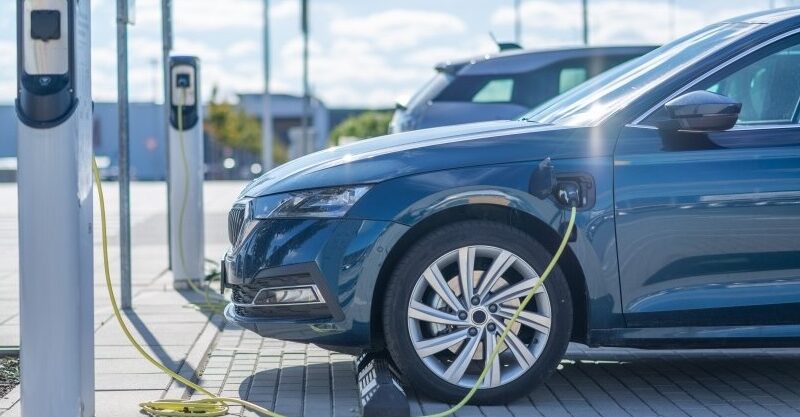Virginia Bails On Electric Vehicle Mandate, Re-Joins South
Just when the US electric vehicle market is reaching critical mass, Virginia Governor Glenn Youngkin is dragging his state back to the olden days of ICE engines. On Wednesday he summarily pulled Virginia out of the new zero emission goalposts set by California, a move that is more than a little ironic considering that Virginia is in hot contention to host a new $1 billion EV battery factory, courtesy of the California firm Applied Materials.
Where California Goes, So Goes The Electric Vehicle Market
Also, the timing of the announcement is somewhat funky. Virginia is not pulling out of the California electric vehicle mandate right this moment. The drop-dead date is the end of 2024 when the latest version of the California mandate takes effect. In Wednesday’s announcement, Governor Youngkin declared that the state is not obligated to enforce the new standards.
Just a wild guess on the timing, but we’re guessing that Youngkin is seeking attention from the new TXSE stock exchange to be headquartered in Texas, announced earlier this week. The initial plan is for TXSE to cover almost the entire former Confederacy of the US, meaning Texas, Alabama, Arkansas, Florida, Georgia, Louisiana, Mississippi, North Carolina, Oklahoma, South Carolina, and Tennessee. Currently the only exceptions are Virginia and Arkansas.
If you have any thoughts about that, drop us a note in the comment thread. Meanwhile, so ends Virginia’s brief role in pushing the US electric vehicle market forward.
By way of background, California adopted the first iteration of the clean vehicle standards all the way back in 2002, to become effective beginning with model year 2005. Under Section 177 of the California Clean Air Act, the standards require a step-up in the percentage of sales of zero emission vehicles in the state. In effect that means battery-powered electric vehicles, though the mandate also allows for fuel cell electric vehicles.
Seventeen other states and the District of Columbia quickly piled onto the California mandate in the years following 2002, partly motivated by the massive size of the California auto market. The California-compliant states initially represented every region of the US except the Southeast. Virginia finally broke the Southeast mold and opted into the California standards just three years ago, in 2021.
Just three years later, there goes Virginia, back to the Southeast.
Mandate? We Don’t Need No Stinking Mandate!
Virginia’s brief flirtation with the California electric vehicle sales mandate began under the tenure of former Democratic Governor Ralph Northam. State lawmakers authorized the Virginia Air Pollution Control Board to adhere to California’s auto emissions standards, as explained by the news organization Courthouse News.
Courthouse News reporter Joe Dodson notes that Youngkin and other Republican officials are now arguing that the 2021 state law “does not compel the adoption of the most recent iteration of the California Air Resources Board’s standards.” Democratic office holders, in contrast, maintain that the 2021 state law is binding.
Under the banner of “Advanced Clean Cars II,” California’s new standard will go into effect on January 1 of 2025, requiring electric vehicle sales for the 2026 model year to account for 35% of new light duty vehicles sold. A 100% electric mandate applies in 2035.
If the neighboring California-compliant jurisdiction of Washington, DC is any indication, Virginia should have no trouble reaching the 35% market in 2026. The Alliance for Automotive Innovation lists DC among the top five states in new electric vehicles sales for Q3 2023 at a relatively healthy 19.3%.
Meanwhile, though, Dodson pegs electric vehicle sales in Virginia at just 9% of new vehicle sales, which partly explains why Youngkin is not particularly eager to push his state into the sparkling green future of zero emission mobility.
In an interesting twist, AAI also notes that California’s Advanced Clean Cars II standards do not necessarily move markets, at least not in the lower tier. “Nearly as many non-ACC II states are above 8 percent EV market share (seven states) as there are ACC II states (nine states in addition to California),” the organization observed.
Cutting Off Your Electric Vehicle Nose To Spite Your Face
Optimistically speaking, Virginia auto dealers could keep pushing zero emission vehicle sales and meet the new California goalposts regardless of Youngkin administration policies, though they have a lot of ground to make up.
They probably should not expect much help from the Youngkin administration. On June 5 the Governor’s office issued a press release that leans heavily on the California-bashing to be expected of a Republican administration.
“EV mandates like California’s are unworkable and out of touch with reality, and thankfully the law does not bind us to their regulations,” huffed Virginia Attorney General Jason Miyares, who issued the opinion in support of Youngkin’s announcement. “California does not control which cars Virginians buy,” he added.
State Senator Ryan McDougle, who co-sponsored legislation to disentangle Virginia from the California mandate, also got a couple of hits in. “Virginia’s laws should not be determined by California politicians. Instead, our laws should be decided by Virginians who are elected to serve Virginia and address issues that face our Commonwealth, not a state nearly 3,000 miles away,” he said.
On the other hand, Governor Youngkin carefully avoided name-checking California. “Once again, Virginia is declaring independence — this time from a misguided electric vehicle mandate imposed by unelected leaders nearly 3,000 miles away from the Commonwealth,” he said.
“The idea that government should tell people what kind of car they can or can’t purchase is fundamentally wrong. Virginians deserve the freedom to choose which vehicles best fit the needs of their families and businesses. The law is clear, and I am proud to announce Virginians will no longer be forced to live under this out-of-touch policy,” he added.
So, why the cautious wording on the part of Youngkin? Could it possibly have anything to do with a $1 billion EV battery factory in the works, courtesy of the California firm Applied Materials?
In April, the Richmond Times-Dispatch dropped word that state officials were working on an incentive package, with details to be announced later, with the aim of settling Applied Materials and its new EV battery factory in Lynchberg.
The Virginia business-boosting organization Cardinal News, for one, was excited. “Dixie is the new Detroit: The Southeast has been quietly building a hub of auto-related plants for decades,” noted CN writer Dwayne Yancey on April 22.
“The Roanoke and New River valleys are part of that, with truck-building operations at Mack Truck in Roanoke County, Volvo in Pulaski County and lots of suppliers in between,” he added.
Incentive package or not, it sure looks like Youngkin and other Republican office holders have pulled the welcome mat out from under Applied Materials. So far this year there has been no official announcement from the company, so stay tuned for more on that.
Follow me @tinamcasey on Bluesky, Threads, Instagram, and LinkedIn.
Photo (cropped): The electric vehicle revolution hit a brick wall in Virginia, where Governor Youngkin has pulled the state out of the new California clean car mandate (courtesy of US DOE).
Have a tip for CleanTechnica? Want to advertise? Want to suggest a guest for our CleanTech Talk podcast? Contact us here.
Latest CleanTechnica.TV Videos

CleanTechnica uses affiliate links. See our policy here.

